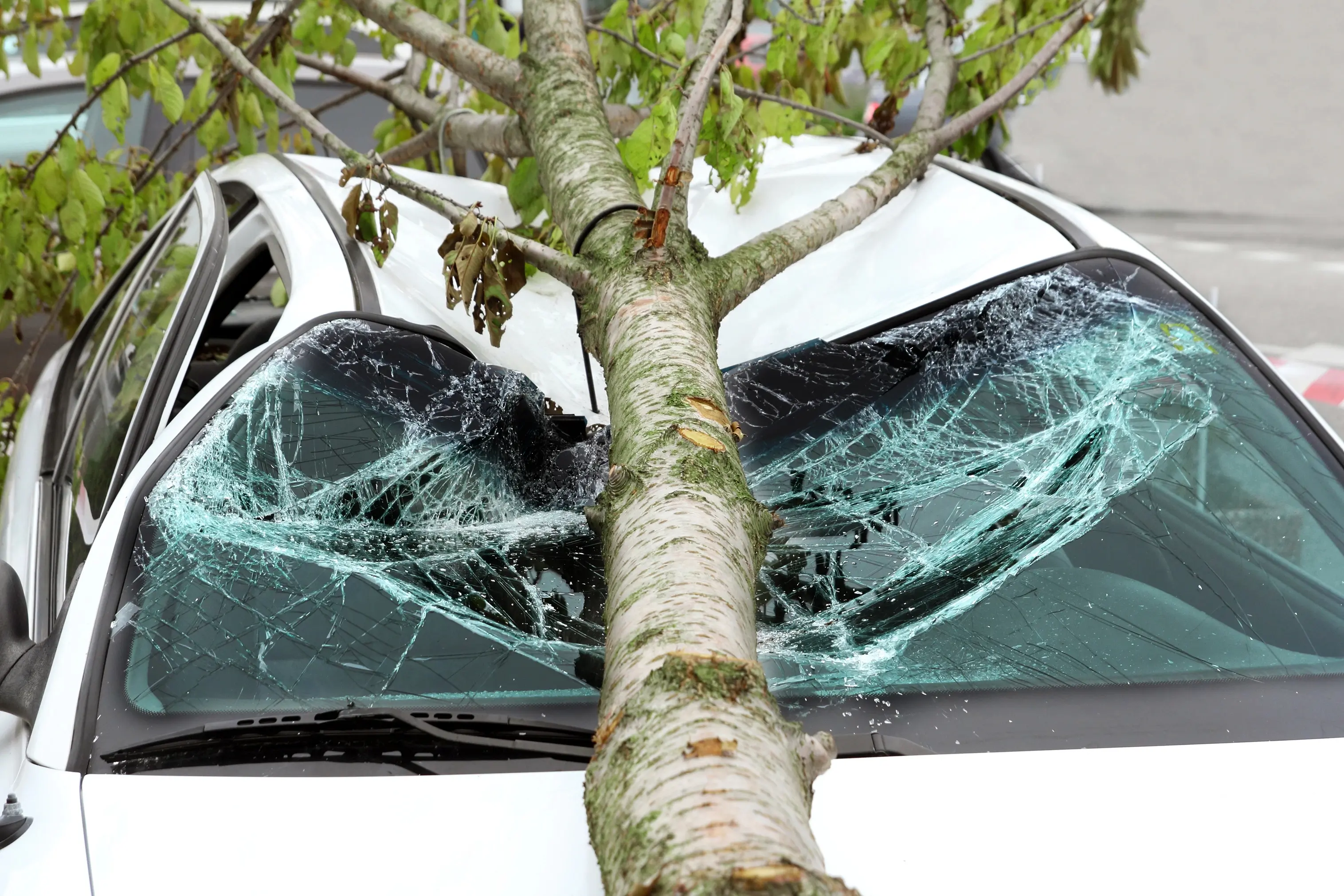Comprehensive coverage in an auto insurance policy covers damage to your vehicle caused by a range of perils, from car theft and vandalism to fire, falling tree branches, hailstorms, and other unexpected events. However, unlike collision insurance, it won’t cover damage from a crash with another car, animal or object.
What does comprehensive insurance cover?
| What it will cover | What it won’t cover |
|---|---|
| Contact with animals Natural disasters (such as earthquakes, floods, hurricanes, tornadoes, hail, and volcanic eruptions) Fire Vandalism Vehicle theft (including parts of the car, such as the catalytic converter) Falling objects (such as tree limbs or ice) Civil disturbances (such as riots) | Damage to your car caused by collisions with other cars or stationary objects Medical expenses Legal fees associated with a car accident Lost income for you or your passengers Damage to another person’s car or property Normal wear and tear Personal property stolen from your vehicle |
When you file a comprehensive claim, your insurance company will cover the cost of repairs up to your policy’s limit, typically your car’s actual cash value. Before your coverage kicks in, you must pay your deductible.
Do you need comprehensive insurance?
Unlike liability insurance, comprehensive insurance is optional coverage not mandated by state minimum insurance requirements — but your lender likely requires it if you lease or finance your car.
Even if you aren’t required to buy it, comprehensive coverage might be beneficial if you live in a high-crime area or an area prone to natural disasters.It is also a good idea if you can’t afford to repair or replace your vehicle on your own. According to the Insurance Information Institute (III), the average comprehensive claim payout in 2022 was $2,738. Without a comprehensive policy, you’d be paying that bill out of pocket.
How much does comprehensive insurance cost?
According to the III, the average cost for a comprehensive auto insurance policy is a little over $134 annually — that’s about $11 per month.
Though you can add comprehensive coverage to a policy with just bodily injury liability and property damage liability insurance, most drivers purchase it as part of a full coverage auto insurance policy. Here’s what the average driver pays monthly for a full coverage policy that includes liability, comprehensive, and collision coverage from these providers.
|
Insurance Company
|
Avg Monthly Quote
|
Avg Annual Quote
|
|---|---|---|
| Grange | $122 | $1,470 |
| Freedom | $204 | $2,452 |
| Aspire Advantage | $221 | $2,650 |
| Safeco | $249 | $2,982 |
| Bluefire | $250 | $3,003 |
| Mercury | $259 | $3,103 |
| Progressive | $268 | $3,211 |
| Anchor General | $269 | $3,229 |
| First Acceptance | $307 | $3,687 |
| Commonwealth Insurance | $316 | $3,791 |
However, every insurance company uses its own formula to calculate the cost of insurance, so your premiums may be higher or lower than these averages. The only way to be sure you’re getting the best rate is to compare car insurance quotes from multiple providers.
What about my deductible?
All comprehensive insurance policies include a deductible. The most common comprehensive deductibles are $250 or $500, but you can usually choose a different amount.
Choosing a higher deductible of $1,000 or more will usually result in lower overall insurance costs. Just make sure you select a deductible you can afford to pay if you need to file a comprehensive claim.
Choosing a lower deductible — such as $250 — can save you money when it’s time to make a claim, but you’ll pay higher car insurance rates.
Consider your deductible before you file a claim
If your car is stolen, it’s probably worth paying your deductible so you can file a claim to recoup the actual cash value of your vehicle. But if a tree branch falls on your vehicle and causes $200 in damage, it doesn’t make sense to pay a $250 deductible to file a claim.
To help you decide when it makes sense to file a comprehensive claim, here’s some advice from Jerry’s experts:
Keep in mind: Even though the damage associated with a comprehensive claim is usually outside of human control, a claim could still increase your insurance rates for 3 years.
Methodology
Data included in this analysis comes from policies that Jerry has quoted within the last 18 months. Jerry services 48 states and offers a range of insurance companies to choose from.

Kayda Norman is an insurance writer and editor with more than 12 years of content experience. She previously worked at NerdWallet as an insurance writer and content management specialist. She has covered a wide range of insurance topics such as high-risk drivers, auto insurance rate factors, and credit-based insurance scores. Her work has been featured in The New York Times, The Washington Post, and USA Today.

Alice Holbrook is an editor with more than a decade of experience covering personal finance, including car insurance. She\\\’s passionate about creating easy-to-understand content that demystifies intimidating topics for readers. Previously, she worked for NerdWallet, and her work has been featured by Newsweek, The Washington Post and the Associated Press, among others.

Lacie Glover is a Lead Writer and Editor with sixteen years’ experience in the insurance category. Prior to Jerry, she spent more than a decade on NerdWallet’s content team writing, editing and then overseeing the auto insurance category, as well as dabbling in other insurance and automotive topics. Prior to her career in the online personal finance content space, Lacie spent time in the hard sciences, in clinical research and chemistry labs. She has a bachelor’s degree from Colorado State University.








